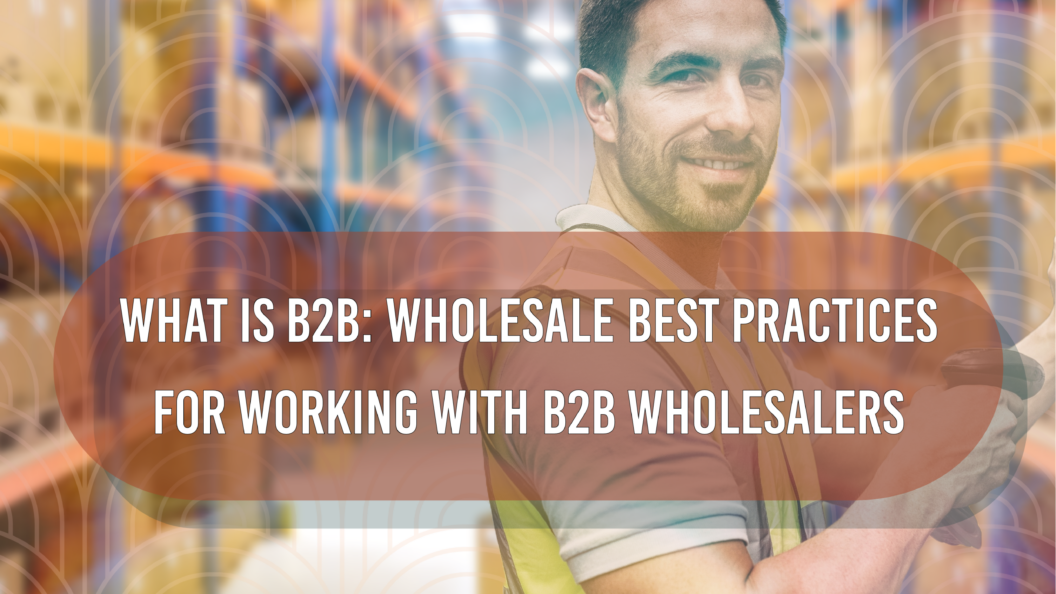What Is B2B Wholesale: Best Practices for Working with B2B Wholesalers
What Is B2B Wholesale: Best Practices for Working with B2B Wholesalers
Author: GDS
B2B wholesale plays an integral role in the global economy, connecting businesses and consumers through the supply chain. B2B wholesalers purchase products from manufacturers and resell them to retailers, other businesses, or organizations in bulk. In the U.S., they generate $11.4 trillion in revenue annually and employ nearly 6 million people, according to IBISWorld and the U.S. Bureau of Labor Statistics, respectively.
B2B wholesale plays an integral role in the global economy, connecting businesses and consumers through the supply chain. B2B wholesalers purchase products from manufacturers and resell them to retailers, other businesses, or organizations in bulk. In the U.S., they generate $11.4 trillion in revenue annually and employ nearly 6 million people, according to IBISWorld and the U.S. Bureau of Labor Statistics, respectively.
What is B2B wholesale?
B2B wholesale is the process of buying goods from manufacturers in bulk and reselling them to retailers or other organizations. As an intermediary in the supply chain, B2B wholesalers are essential for businesses seeking to purchase products in large quantities at a discounted rate. By leveraging their knowledge of the market, they can provide buyers with different solutions to meet their needs while ensuring a smooth transaction process.
What is B2B wholesale?
B2B wholesale is the process of buying goods from manufacturers in bulk and reselling them to retailers or other organizations. As an intermediary in the supply chain, B2B wholesalers are essential for businesses seeking to purchase products in large quantities at a discounted rate. By leveraging their knowledge of the market, they can provide buyers with different solutions to meet their needs while ensuring a smooth transaction process.
Overview of US Market & Employment Figures
The U.S. wholesale sector generates $11.4 trillion in revenue annually and employs nearly 6 million people, according to IBISWorld and the U.S. Bureau of Labor Statistics, respectively. B2B wholesalers play a significant role in the global economy as key intermediaries for most industry sectors by supplying retailers with much-needed goods from manufacturers.
Overview of US Market & Employment Figures
The U.S. wholesale sector generates $11.4 trillion in revenue annually and employs nearly 6 million people, according to IBISWorld and the U.S. Bureau of Labor Statistics, respectively. B2B wholesalers play a significant role in the global economy as key intermediaries for most industry sectors by supplying retailers with much-needed goods from manufacturers.
Benefits of working with B2B wholesalers:
1. Access to Bulk Purchasing at Discounted Rates – B2B wholesalers can provide buyers access to bulk purchasing options at discounted rates, allowing businesses to save money while also ensuring that they have a steady supply of goods.
2. Leveraging Knowledge Of The Market – B2B wholesalers have extensive knowledge of the market and can provide buyers with different solutions to meet their specific needs.
3. Establishing Long-term Relationships – Working with a reliable B2B wholesaler can help businesses establish long-term relationships, allowing for more efficiency and better communication between the buyer and seller.
4. Streamlined Transaction Process – B2B wholesalers can streamline the transaction process, ensuring that orders are processed quickly and efficiently.
5. Comprehensive Services – In addition to providing access to bulk purchasing at discounted rates, B2B wholesalers also offer comprehensive services such as product research, product sourcing, inventory management, and logistics support.
6. Access To New Markets – Working with a B2B wholesaler can give businesses access to new markets, allowing them to expand their reach and maximize profits.
Benefits of working with B2B wholesalers:
1. Access to Bulk Purchasing at Discounted Rates – B2B wholesalers can provide buyers access to bulk purchasing options at discounted rates, allowing businesses to save money while also ensuring that they have a steady supply of goods.
2. Leveraging Knowledge Of The Market – B2B wholesalers have extensive knowledge of the market and can provide buyers with different solutions to meet their specific needs.
3. Establishing Long-term Relationships – Working with a reliable B2B wholesaler can help businesses establish long-term relationships, allowing for more efficiency and better communication between the buyer and seller.
4. Streamlined Transaction Process – B2B wholesalers can streamline the transaction process, ensuring that orders are processed quickly and efficiently.
5. Comprehensive Services – In addition to providing access to bulk purchasing at discounted rates, B2B wholesalers also offer comprehensive services such as product research, product sourcing, inventory management, and logistics support.
6. Access To New Markets – Working with a B2B wholesaler can give businesses access to new markets, allowing them to expand their reach and maximize profits.
Challenges of B2B wholesale
Despite its many benefits, the B2B wholesale market also presents some challenges. For instance, buyers may face difficulty in finding reliable and experienced wholesalers, making it more difficult to maintain consistent levels of quality and service. Additionally, long-term commitments with wholesalers can be difficult to manage if the buyer’s needs change or their business environment shifts. Additionally, buyers may have to pay more for goods in the short term due to the higher bulk purchase prices offered by B2B wholesalers. Overall, these challenges can be overcome with careful planning and research, but they should still be taken into consideration when considering using a B2B wholesaler. By understanding both the benefits and drawbacks of working with a B2B wholesaler, businesses can make an informed decision that best serves their needs.
Challenges of B2B wholesale
Despite its many benefits, the B2B wholesale market also presents some challenges. For instance, buyers may face difficulty in finding reliable and experienced wholesalers, making it more difficult to maintain consistent levels of quality and service. Additionally, long-term commitments with wholesalers can be difficult to manage if the buyer’s needs change or their business environment shifts. Additionally, buyers may have to pay more for goods in the short term due to the higher bulk purchase prices offered by B2B wholesalers. Overall, these challenges can be overcome with careful planning and research, but they should still be taken into consideration when considering using a B2B wholesaler. By understanding both the benefits and drawbacks of working with a B2B wholesaler, businesses can make an informed decision that best serves their needs.
6 B2B wholesale Challenges
1. Difficulty in finding reliable and experienced wholesalers
Finding reliable and experienced B2B wholesalers can be a challenge due to the sheer number of businesses competing for the same customers. It is important to thoroughly research potential wholesalers before making a purchase decision, as mistakes in this area can lead to costly delays or disruptions in product delivery.
2. Long-term commitments with wholesalers can be difficult to manage
Long-term commitments with wholesalers can be difficult to manage if the buyer’s needs change or their business environment shifts. This is because there are often contracts and agreements in place that need to be renegotiated, which can involve additional costs and delays.
3. Higher bulk purchase prices offered by B2B wholesalers
B2B wholesalers offer higher bulk purchase prices than most retail outlets, making them an attractive option for businesses looking to increase their margins. However, the costs of purchasing and stocking the goods in larger quantities must be weighed against the potential profits that can be gained by taking advantage of lower wholesale prices.
4. Careful planning and research is required to overcome challenges
Careful planning and research is essential when it comes to selecting B2B wholesalers. Businesses need to take into consideration factors such as location, product quality, pricing policies, reputation, customer service, delivery capabilities and payment terms before committing to a particular supplier. Doing so will help ensure that all the potential advantages of using a B2B wholesaler are maximized while minimizing the potential risks.
5. Need to take potential drawbacks into consideration when deciding whether or not to use a B2B wholesaler.
Businesses should be aware of potential drawbacks when selecting a B2B wholesaler to work with. There is the risk that suppliers may not be able to meet customer demand if supply chains are disrupted, as well as the possibility of issues arising due to miscommunication or failure to adhere to contractual obligations. In addition, there might be discrepancies in quality between products from different suppliers, making it difficult to maintain consistent quality standards. All of these factors should be taken into consideration when deciding whether or not to use a B2B wholesaler.
6. Risk of not being able to meet customer demand if supply chain is disrupted.
Any disruption in the supply chain can have a direct impact on businesses, especially those that rely heavily on B2B wholesalers. If a business is unable to obtain necessary goods from its chosen supplier due to any issues such as delayed shipments or damaged inventory, it could result in them not being able to meet customer demand and losing out on potential profits.
6 B2B wholesale Challenges
1. Difficulty in finding reliable and experienced wholesalers
Finding reliable and experienced B2B wholesalers can be a challenge due to the sheer number of businesses competing for the same customers. It is important to thoroughly research potential wholesalers before making a purchase decision, as mistakes in this area can lead to costly delays or disruptions in product delivery.
2. Long-term commitments with wholesalers can be difficult to manage
Long-term commitments with wholesalers can be difficult to manage if the buyer’s needs change or their business environment shifts. This is because there are often contracts and agreements in place that need to be renegotiated, which can involve additional costs and delays.
3. Higher bulk purchase prices offered by B2B wholesalers
B2B wholesalers offer higher bulk purchase prices than most retail outlets, making them an attractive option for businesses looking to increase their margins. However, the costs of purchasing and stocking the goods in larger quantities must be weighed against the potential profits that can be gained by taking advantage of lower wholesale prices.
4. Careful planning and research is required to overcome challenges
Careful planning and research is essential when it comes to selecting B2B wholesalers. Businesses need to take into consideration factors such as location, product quality, pricing policies, reputation, customer service, delivery capabilities and payment terms before committing to a particular supplier. Doing so will help ensure that all the potential advantages of using a B2B wholesaler are maximized while minimizing the potential risks.
5. Need to take potential drawbacks into consideration when deciding whether or not to use a B2B wholesaler.
Businesses should be aware of potential drawbacks when selecting a B2B wholesaler to work with. There is the risk that suppliers may not be able to meet customer demand if supply chains are disrupted, as well as the possibility of issues arising due to miscommunication or failure to adhere to contractual obligations. In addition, there might be discrepancies in quality between products from different suppliers, making it difficult to maintain consistent quality standards. All of these factors should be taken into consideration when deciding whether or not to use a B2B wholesaler.
6. Risk of not being able to meet customer demand if supply chain is disrupted.
Any disruption in the supply chain can have a direct impact on businesses, especially those that rely heavily on B2B wholesalers. If a business is unable to obtain necessary goods from its chosen supplier due to any issues such as delayed shipments or damaged inventory, it could result in them not being able to meet customer demand and losing out on potential profits.
Conclusion
In conclusion, B2B wholesalers can play an important role in the supply chain and help businesses streamline their operations. However, businesses should take into consideration factors such as location, product quality, pricing policies, reputation, customer service, delivery capabilities and payment terms before committing to a particular supplier. Additionally, potential drawbacks should be taken into account when deciding whether or not to use a B2B wholesaler, such as the risk of not being able to meet customer demand if supply chains are disrupted. With careful consideration and research, businesses can find the right B2B wholesaler for their needs and benefit from their services.
Contact GDS Today!
Click here to learn how B2B wholesalers can help streamline operations and increase profits for your business!
Contact GDS Today!
Click here to learn how B2B wholesalers can help streamline operations and increase profits for your business!








